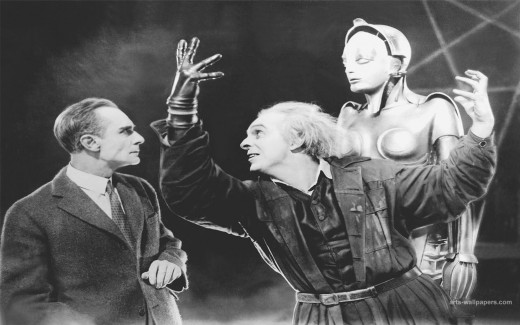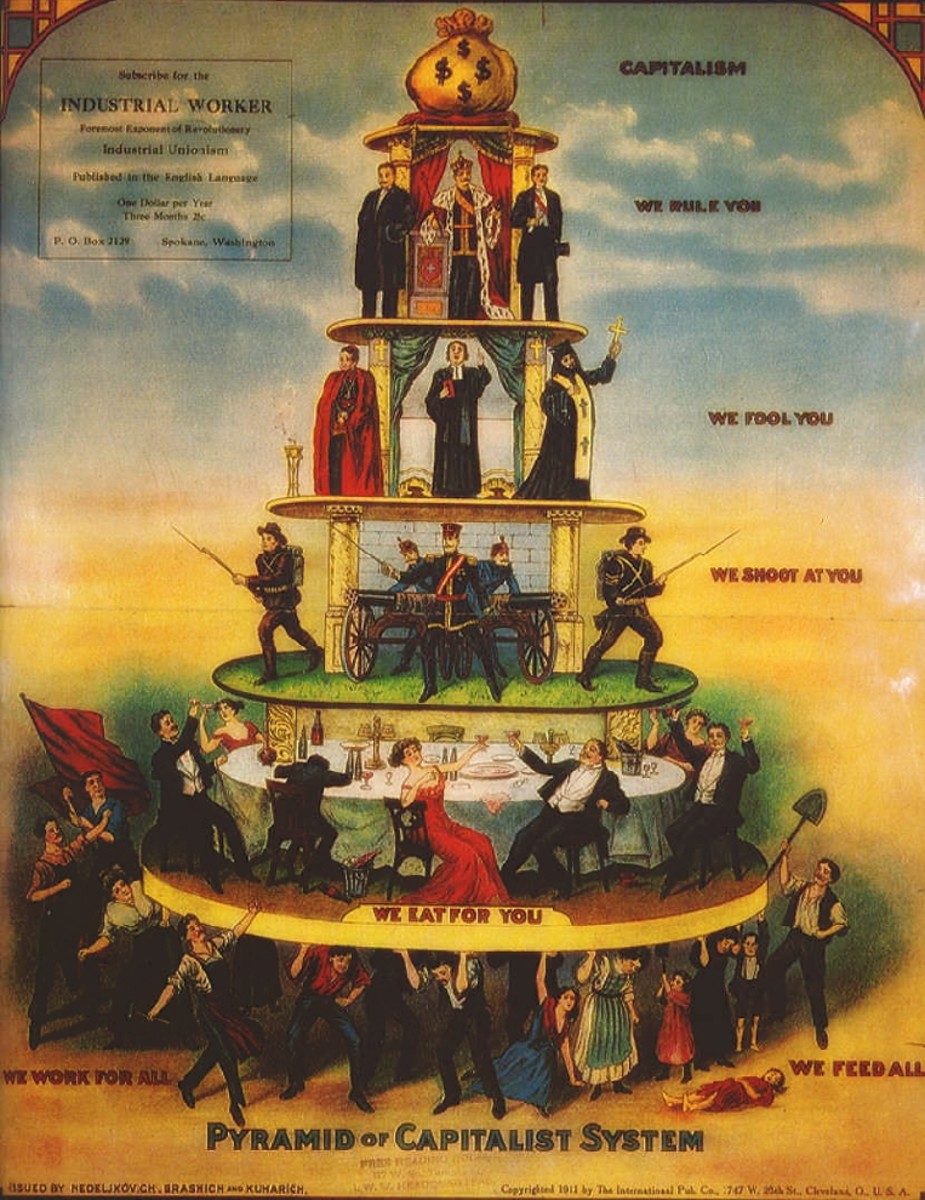- HubPages»
- Education and Science»
- History & Archaeology»
- History of the Modern Era
Modernity and Capitalism as Early Twentieth Century Germans Saw it

A huge concern for Germans at the turn of the twentieth century was modernity and how capitalism played a part in it. At a time of turmoil and upheaval with a World War brewing and later a second one, the world was divided into East and West. For many Germans, the West was seen as the enemy in more ways than one. Fritz Lang’s film, Metropolis, (1927), touches upon these problems of modernity, capitalism, and the East/West division. In this film, Lang portrays capitalism and modernity as things to be both welcomed and respected. He offers a solution to those who fear modernity by suggesting that it is the heart that must make the mind and the hand work together. As long as the heart is in place—between the head and the hand—modernity, and therefore, capitalism, can’t go wrong. This was, in my opinion, a simplified interpretation of a very complex problem, however, Lang offers reasons in an essay he wrote to offset such a simplistic reasoning. Lang tackles this problem from an artistic viewpoint but his interpretation of capitalism in the modern world in his film is rather idealized. He presents a best case scenario to the viewer. When compared to other German thinkers of the time Lang’s interpretation comes up short. Max Weber and Walter Benjamin, also were concerned with modernity and capitalism, and both offer more comprehensive, but widely different interpretations of modernity in Germany and how capitalism was inevitably one with modernity. So, in essence, the real problem for the early twentieth century German concerned with capitalism and modernity was how the individual interpreted, and dealt with it.
Max Weber
In 1905, Max Weber wrote in The Protestant Ethic and the Spirit of Capitalism, “Whoever does not adapt his manner of life to the conditions of capitalistic success must go under, or at least cannot rise.” He saw modernity as capitalism, but capitalism wasn’t necessarily what he was criticizing. Capitalistic greed, specifically, was what concerned Weber. Capitalism alone was not a bad thing, if utilitarianism was employed, as in the case of Benjamin Franklin, who wrote extensively on being frugal and honest in financial matters. Weber contrasted Franklin’s type of capitalism to the modern capitalism he viewed as an “economic survival of the fittest,” where “the universal reign of absolute unscrupulousness in the pursuit of selfish interests,” dominated. Capitalism, for him, had turned into a winner-take-all game since its earliest forms and only the unethical and immoral could ever hope to get ahead in this kind of modern economy. This was a problem for the German Protestant who remained traditional and in doing so, became the exact opposite of modern and therefore the opposite of capitalism. Weber believed that history was rationalized and so, too, must capitalism, but in order to do that Protestant ethics must be employed. In that sense, Weber believed that honest capitalism, like the type that Benjamin Franklin advocated, could be rationalized through religion if a hierarchy was implemented. Fritz Lang’s film also presented religion as a sort of way to rationalize modernity and capitalism with the role of Maria, who acted as sort of a religious figure and model for how the proletariat should behave. Lang presented Freder as the model for how the elite bourgeois property owner should act. By presenting him, Freder, as the heart and the key to making the head, Joh Fredersen, and the hand, the Guardian of the Heart Machine, work together, Lang has seemingly agreed with Weber’s interpretation of “ethical capitalism.” But this is not the only topic that Weber and Lang seem to agree on.

Fritz Lang
In Fritz Lang’s 1926 essay, The Future of the Feature Film in Germany, Lang compares German film to the American film industry. Although the American film industry may have better technology, Lang sees this as America’s demise in the film industry, because the American will never reach beyond the surface to create a truly intellectual piece of art. Just like Weber, Lang saw Germany as the foundation for a truly ethical and responsible interpretation of what the rest of the world, and particularly America, was doing. Lang believed that art, specifically film, would “first find its form in Germany.” He saw the lack of financial reserves in Germany for film as a good thing because that was “what forces us to compensate a purely material imbalance through an intellectual superiority.” Again, like Weber who saw German Protestantism as the ethical foundation for capitalism, Lang saw this financial obstacle as an opportunity to showcase Germany’s intellect and kultur. In Lang’s film, Metropolis, we can see his ideology put to work. Lighting and shading in the film make a strong impression and convey the mood sublimely. Although other things in the film were kept simple, like the set, this film was quite successful in making visual the “ideational content of the experience seen from the perspective of the one who experiences it,” and taking this art form beyond what the silver screen, alone, could promise. Lang, however, seems only concerned with the interpretation of art, and is not really concerned with the economical truths of capitalism and modernity.
Walter Benjamin
Walter Benjamin, like Lang, was concerned with art in the modern world. However, Benjamin was concerned with the mechanical reproduction of art and the effect this had on the proletariat. In his 1936 essay, The Work of Art in the Age of Mechanical Reproduction, he wrote about art being reproduced throughout history, but after the turn of the 20th century, art was mechanized and reproduced like never before, and that this cheapened the art and made it less of an art form. Like Weber’s concern with unethical capitalism, Benjamin saw the mass reproduction of art as unethical, as well. He stated, “The authenticity of a thing is the essence of all that is transmissible from its beginning… Since the historical testimony rests on the authenticity, the former, too, is jeopardized by reproduction… And what is really jeopardized when the historical testimony is affected is the authority of the object.” Like capitalism that was transformed into greed in modern times, art was transformed into un-original, non-unique, “work of art designed for reproducibility.” This was also a concern of Lang who saw the film industry in America as decadent and lacking emotion and human value, however, he thought that the way for the film industry to rise above the decadence was to “bestow upon the film the double gift of ideas and soul.” In doing this, Lang thought film would “become the strongest instrument available for the mutual understanding of peoples, who otherwise have such difficulty understanding each other in all too many languages.” Benjamin, however, had other concerns with the mass reproduction of art. He believed that, “Fascism seeks to give them (the proletariat) expression while preserving property.” He saw the logical result of doing this as war because it set a goal for the masses while supplying artistic gratification. In this sense, one could argue that both Weber and Lang were at least trying to see the good in capitalism, while Benjamin only saw the worst possible outcome.
Conclusion
Capitalism, for these German thinkers and artist, meant modernity. Some Germans, like Max Weber, although highly critical of capitalism and modernity in general, saw a way to make it work in an ethical manner that was dependent upon the individual. He gave the example of Jacob Fugger who, unlike Benjamin Franklin who approached capitalistic ideas with a moral attitude, wanted to make as much money as he could for as long as he could. For Weber, this type of attitude defeated its own purpose because making money ultimately became an end in itself, and true happiness became irrational. Fritz Lang, however, was perhaps was not as critical of capitalism as he was of the film industry, which he saw as lacking the “human face,” in the American film industry. He believed that Germany would be the home of this art form because only Germans could inject soul and intelligence into film. His film, Metropolis, was actually a very good representation of what Lang wanted from the film industry, and in short, from capitalism. While Weber might agree that capitalism in the wrong hands was immoral, Lang probably would not have agreed with Germans who saw modernity or capitalism as a bad thing. Finally, Walter Benjamin was very critical of capitalism and viewed it as the main problem in the modern art industry. The fact that it had become a mechanized industry in and of itself was a problem for Benjamin because that took away the true meaning of the art, and rendered it merely as a meaningless reproduction void of any authenticity or authority. He also saw this as a sort of trick used by fascists to calm the proletariat and make them feel like they held some sort of worth in the eyes of the bourgeoisie. Good or bad, capitalism and modernity seem to go hand in hand. In today’s society one does not refer to a country as modern unless it has been fully indoctrinated into the capitalist system that dominates our global economy.
Sources
Benjamin, Walter. The Work of Art in the Age of Mechanical Reproduction, 1936.
Lang, Fritz. The Future of the Feature Film in Germany, 1926.
Metropolis, 1927.
Weber, Max. The Protestant Ethic and the Spirit of Capitalism, 1905.
More Interesting Articles by Emmaspeaks
- The American Holocaust: the One They Don't Tell You About In School
The Native American Holocaust is perhaps the most overlooked piece of U.S. history. It happened, and this 'great country' of ours was responsible for the deaths millions of innocent lives. - Japanese Hongaku
Japanese Buddhism is unique and different from other Buddhisms and Hongaku is one reason why that is. - The Spaniards' Most Powerful Weapon: Religion
It wasn't might or technology that aided the Spanish in their conquest of the New World. It was religion, without a doubt, because it could serve so many different purposes for them. - Another Look at Marxism
Class struggle, now more than ever, is something we should all think about, and while the political conclusions of Marxism are debatable, the social concepts are an observable truth in today's society. Marxism is making a comeback. Do you know what s - An Encounter Between Warring Cultures: The Spanish and the Aztecs
Among the many myths that exist surrounding the Spanish conquest of the Aztec Empire there is the belief that the Spanish were exceptional and that is why the Aztecs fell. This article will show why this is just a myth by comparing their different wa








